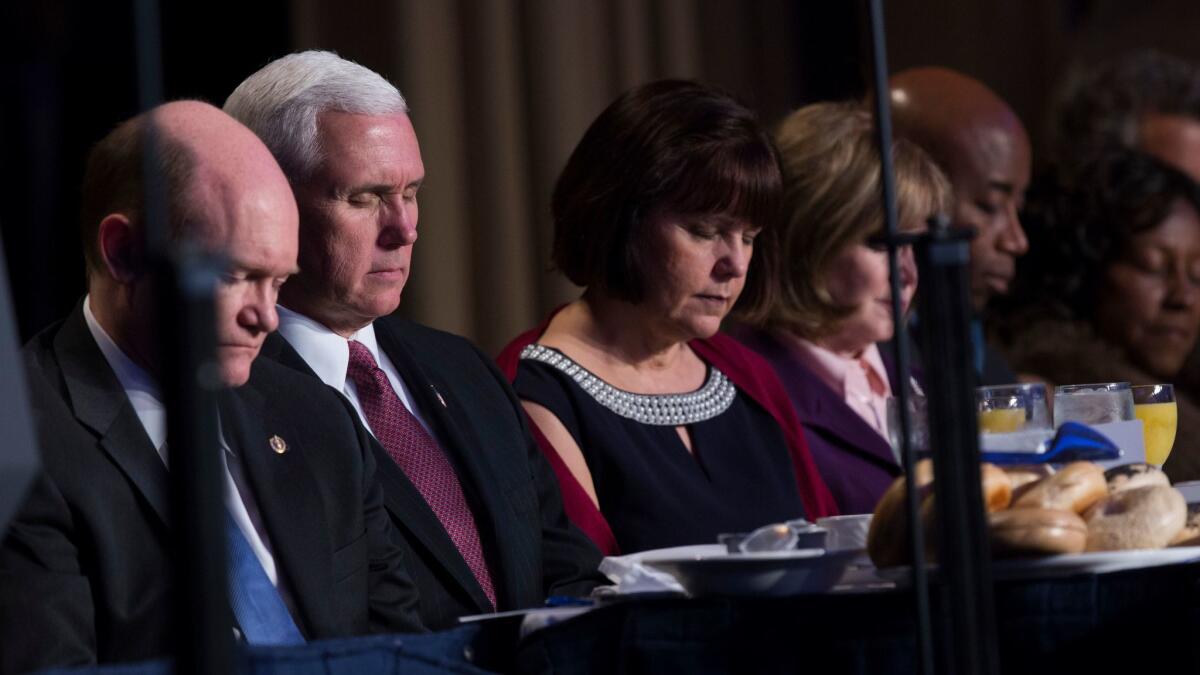Op-Ed: Don’t listen to the complainers on the religious right. We need the Johnson Amendment

- Share via
Donald Trump’s promise to “totally destroy” the Johnson Amendment, delivered at the National Prayer Breakfast on Thursday, is a totally bad idea, one that compromises the 1st Amendment.
The Johnson Amendment, passed by Congress in 1954 and named for Lyndon Johnson, then a U.S. senator, is a provision in the tax code that prohibits tax-exempt organizations from openly supporting political candidates. In the words of the tax code, “all section 501(c)(3) organizations are absolutely prohibited from directly or indirectly participating in, or intervening in, any political campaign on behalf of (or in opposition to) any candidate for elective public office.”
I have no doubt that Johnson, consummate politician that he was, had his own reasons for pushing the legislation in 1954; he was running for reelection and didn’t want adversarial groups working against him under cover of tax-exempt organizations. But those motives should in no way diminish the wisdom of the measure.
Leaders of the religious right in recent years, however, have been pushing for a repeal of the Johnson Amendment. They argue that pastors should be able to make political endorsements from the pulpit without jeopardizing their churches’ tax exemptions. The fact that they cannot now do so, they argue, represents an infringement on their religious freedom.
That’s utter nonsense. The Johnson Amendment merely ensures that taxpayers do not subsidize partisan politicking. It also ensures that tax-exempt organizations do not serve as the conduit for tax-exempt contributions to political candidates.
By complaining about the supposed limitations on their free speech, the religious right fails to acknowledge that tax exemption is a form of public subsidy.
Kvetching from the religious right is really just an attempt to confuse voters with sleight of hand. Even as they complain about the supposed limitations on their freedom of speech, these leaders fail to acknowledge that tax exemption is a form of public subsidy.
The vast majority of the nation’s religious organizations — churches, mosques, synagogues — pay no taxes other than Social Security taxes on wages. So, no income or corporate tax and no property taxes.
We can have a vigorous debate about whether or not such an exemption is a good thing. (I think, on balance, it is; the founders recognized the value of voluntary associations and sought to encourage them.) But that discussion aside, the bottom line is that taxpayers in any given community effectively subsidize religious groups by paying extra taxes to support municipal services such as police protection, firefighters, parks, snow removal, road maintenance and the like.
These institutions certainly benefit from those services. If a fire breaks out at a church or synagogue, the fire department responds – even though these religious organizations pay no property taxes to support firefighter salaries. Local taxpayers take up the slack for the tax exemption on property that would otherwise be quite valuable.
All the Johnson Amendment requires is that, in exchange for that subsidy, the beneficiaries refrain from partisan politicking.
Various entities, including the Alliance Defending Freedom, have nevertheless urged pastors to defy the law and endorse political candidates. Jay Sekulow, chief counsel for the American Center for Law and Justice, asserts that the Johnson Amendment “prevents religious leaders from truly exercising their constitutionally-protected free speech rights when they act in their official capacity as a pastor or head of a religious, tax-exempt organization.”
More nonsense. Pastors, or any other religious leader, can make political endorsements from the pulpit or in any other forum. Their employer need only to renounce their tax exemptions — their public subsidies — and they are free to be as partisan as they wish.
But there is another reason why the Johnson Amendment is a good idea and should not be repealed. Religion has flourished in the United States as nowhere else in the world precisely because the government has (for the most part, at least) stayed out of the religion business, and vice versa.
Despite the religious right’s persistent attempts to circumvent it, the 1st Amendment is the best friend that religion ever had. It ensures that there is no established church, no state religion, and that religious groups can compete for adherents on an equal footing. Evangelicals, by the way, have historically fared very well in that free marketplace.
The Johnson Amendment both derives from, and builds upon, the 1st Amendment. It reinforces the wall of separation between church and state that was advocated by Roger Williams, founder of the Baptist tradition in America. We should also remember that Williams wanted a “wall of separation” between the “garden of the church” and the “wilderness of the world” because he feared that the integrity of the faith would be compromised by too much entanglement with politics.
That’s a lesson worth recalling today
Randall Balmer is chairman of the religion department at Dartmouth College. His most recent book, “Evangelicalism in America,” includes several chapters on the 1st Amendment and the Baptist tradition.
Follow the Opinion section on Twitter @latimesopinion or Facebook
More to Read
A cure for the common opinion
Get thought-provoking perspectives with our weekly newsletter.
You may occasionally receive promotional content from the Los Angeles Times.







